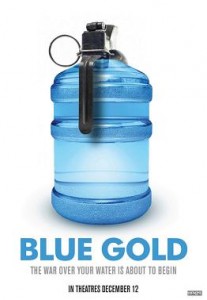 I recently watched a documentary titled Blue Gold: World Water Wars. As you can imagine, the film focused on water use, abuse, and conflict issues around the world. Considering the hubbub everyone is having over Team Green’s water bottle ban, I recommend everyone watch this documentary. It is not entirely about bottled water and gives a broader overview of current water problems. Topics include surface water pollution, overuse of aquifers, problems with privatization, and possible solutions.
I recently watched a documentary titled Blue Gold: World Water Wars. As you can imagine, the film focused on water use, abuse, and conflict issues around the world. Considering the hubbub everyone is having over Team Green’s water bottle ban, I recommend everyone watch this documentary. It is not entirely about bottled water and gives a broader overview of current water problems. Topics include surface water pollution, overuse of aquifers, problems with privatization, and possible solutions.
Testimony from experts such as Maude Barlow, Tony Clarke, Vandana Shiva, and Ric Davidge provided informed opinions over these issues. Barlow in particular was heavily involved in international water issues and advised on water to the President of the United Nations in 2009. I found these particular speakers the most informative and they have experienced the most striking water conflicts to date. The documentary proposes some alternatives to our current water extraction methods and details some of the main issues, such as internal and external politics, privatization, and desertification. The movie predicts violent water conflicts will become more and more common as our water supply dwindles. Much of the conflicts arose due to the price of water, such as those in Bolivia, Uruguay, and South Korea. One conflict in particular was where the protesters were average farmers and street vendors who challenged an ingrained government-backed corporation and won. International conglomerates like Veolia and Suez were kicked out of their countries. Perhaps these conflicts will provide good and bad methods of resolution that will be necessary in the future.
By far it seemed the documentary’s clearest message for reform was about water pricing. The movie shows very clearly that charging for water, albeit at outrageous prices in third world countries, cause many problems. I don’t think the United States would be safe from the runaway effects of privatization and greed of multinational corporations. Indeed, some of our water sources have been bought by companies like Suez and Veolia. So it seems privatization, as it is now, is not the answer. That’s just my opinion after watching Blue Gold. I understand that this documentary was biased, and if readers have suggestions of alternate readings or films detailing opposite opinions, I’d love to see them.
By Alanna Scheinerman, Class of 2013

Hey just wanted to give you a quick heads up.
The words in your article seem to be running off the screen in Opera.
I’m not sure if this is a format issue or something to do with web browser compatibility but I thought I’d post to let you know.
The layout look great though! Hope you get the problem
fixed soon. Many thanks
Water economist David Zetland’s wonderful little book, “The End of Abundance” deals nicely with the economics and social justice issues. I highly recommend it. If you wish, I will reimburse you for a copy if you wish to purchase it yourself – just send the receipt over the 236 Harkness and tell me where to send the reimbursement.
An even better place to begin is to watch the series of very short (in total less time than the Blue Gold film) video presentations on Development Economics and Water presented by Alex Tabarrok and Tyler Cowen at their new venture Marginal Revolution University. They handle each of the claims made in the film one by one, and demonstrate the “pros” and “cons” of various privatization efforts around the world and discuss the very important public choice aspects behind those. I’d post the link, but that gets the posts blocked on this site, so go to mruniversity dot com and then click the course Development Economics and scroll down the menu for the series on Water Economics.
I look forward to your posts on it.
Also, several students in my environmental economics class wrote papers evaluating the claims made in the video, you might ask them to share with you.
Finally, my Eco 108 class addresses most of these issues without specifically referencing water.